|
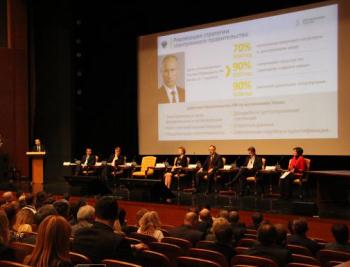 IT-Forum is one of the biggest
events devoted to information society and e-government development issues in the
Ural Federal District, being held since 2008, and in 2013 it honorably
continued the tradition of holding all-Russia international forums on
information society. IT-Forum is one of the biggest
events devoted to information society and e-government development issues in the
Ural Federal District, being held since 2008, and in 2013 it honorably
continued the tradition of holding all-Russia international forums on
information society.
The Forum was attended by more
than 800 people from 7 countries and 30 subjects of the Russian Federation.
There was a plenary session and 11 sections, more than 83 reports were made.
At the Forum the creation of conditions
for development and implementation of best practices providing for improvement of
quality of life of people on the basis of ICT use, and promotion of successfully
operating programs and projects, were discussed,
exchange of experience between Russian and international experts in this sphere was held.
The first plenary session was opened
by Natalia Komarova, Governor of Khanty-Mansiysk Autonomous Region - Yugra. She emphasized that information in
contemporary world is the key to a complex stable improvement of quality of
life of people, and that development of information technologies is one of
priorities for the Government of the Region. She also noted that Yugra is included in the
top five of leading regions in terms of information society development.
Then Oleg Pak, Deputy Minister
of Communication and Mass Media of the Russian Federation, announced the greeting
from the Minister of Communication and Mass Media of the Russian Federation,
Nikolay Nikiforov. In the greeting there
was expressed the gratitude to the Governor and the Government of Khanty-Mansiysk
Autonomous Region – Yugra for enabling the discussion of information society
development in the Russian Federation.
Issues related to providing wide
range access, development of e-government services, ICT use in the system of health
care, education, culture, overcoming inequality between Russian regions in their
access to ICT and its use, were counted as urgent problems.
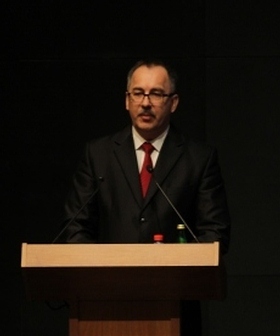 Welcoming speeches were also delivered by Vladimir Manka, Chairman of the Bansko-Bystritskiy region of
the Slovak Republic; Dmitry Strashnov, Director General of the FSUE “Russian Post”; Juan Navas-Sabater,
Head of Sector of Sustainable Development of the World Bank in the Russian Federation. Welcoming speeches were also delivered by Vladimir Manka, Chairman of the Bansko-Bystritskiy region of
the Slovak Republic; Dmitry Strashnov, Director General of the FSUE “Russian Post”; Juan Navas-Sabater,
Head of Sector of Sustainable Development of the World Bank in the Russian Federation.
The greeting on behalf of the
UNESCO Bureau in Moscow and UNESCO Institute on Information Technologies in
Education was announced by Svetlana Knyazeva.
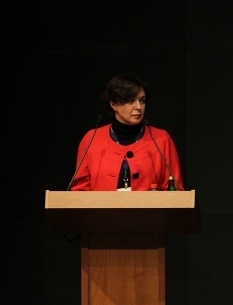 The plenary session was chaired
by Yury Hohlov, Chairman of the IIS Board of Directors, and academician of the Russian
Engineering Academy. The plenary session was chaired
by Yury Hohlov, Chairman of the IIS Board of Directors, and academician of the Russian
Engineering Academy.
In conclusion of the first plenary
session a number of papers were signed: cooperation agreement between the Government of Khanty-Mansiysk Autonomous Region
– Yugra and the Federal State Unitary Enterprise “Russian Post”; Memorandum of mutual
understanding between the Government of Khanty-Mansiysk
Autonomous Region – Yugra and the International Bank of Reconstruction and Development;
and cooperation agreement between the Government of Khanty-Mansiysk Autonomous Region
– Yugra and "Control of fiber optics on overhead power transmission
lines of interregional grid distribution
companies" OJSC.
On the first day of the Forum a
ceremonial opening of exhibition “Technologies of electronic state” was held.
The exhibition was visited by Natalia Komarova, Governor of Khanty-Mansiysk Autonomous
Region – Yugra, and Oleg Pak, Deputy Minister of Communication and Mass Media of
the Russian Federation. The achievements of the region were presented by Andrey
Borodin, Director of Department of information technologies of Khanty-Mansiysk Autonomous
Region – Yugra.
Further work of the Forum was
held in a format of parallel thematic sections. IIS experts actively
participated in the organization of sections, and also acted as chairmen and
spokespersons at the sessions.
Within the framework of the section
"Development of e-government services", which was held under
chairmanship of Oleg Pak, Deputy Minister of Communication and Mass Media of
the Russian Federation, the Head of IIS
Directorate of Perspective Projects Alexander Evtyushkin reported on “Missing elements of infrastructure of e-government in the Russian
Federation”.
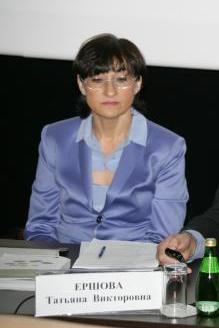 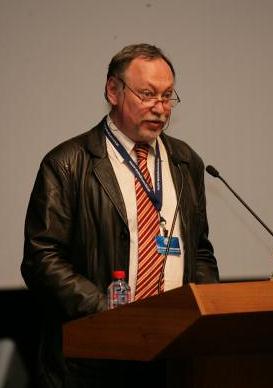 Tatiana Ershova, IIS Director General,
chaired the section “ICT use in the sphere of Culture”, moderated the section “ICT-infrastructure
for social and economic development” and within the framework of the latter
reported on “ICT-infrastructure for life: to what extent advantages of
information society are available for Russian households”. Tatiana Ershova, IIS Director General,
chaired the section “ICT use in the sphere of Culture”, moderated the section “ICT-infrastructure
for social and economic development” and within the framework of the latter
reported on “ICT-infrastructure for life: to what extent advantages of
information society are available for Russian households”.
At the
section "Overcoming inequality between Russian regions in access to ICTs
and their use” Sergey Shaposhnik, Head of IIS Directorate of Directorate of
Monitoring Information Society Development, presented the Index of Russian
Regions E-readiness for 2011-2012, which is being published by IIS annually.
The Forum ended with the second
plenary session, during which Alexander Kim, First Deputy Governor of Khanty-Mansiysk
Autonomous Region – Yugra, handed over
diplomas and prizes to winners of the international student competition “IT
Planet 2012/2013”: to Daniil Kazantsev for the 3rd position at
competition of innovative start-up developments in the sphere of information
technologies and to 7th grade pupil of Secondary School #1 Nikita
Sychev for victory in the competition in
mathematics amongst 7 and 8 grades "5-3-1". The competition was
organized by Yugra research institute of information technologies in on-line
mode and was held at IT-Forum on June 4.
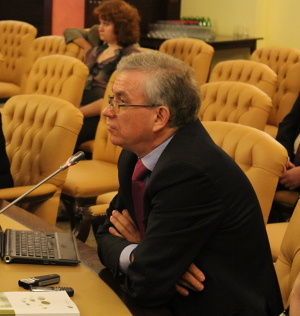 Then the results of work of
sections were summarized. Results of work of sections "Development of e-government
services” and «Overcoming inequality between Russian regions in access to ICTs"
were summed up by Roman Urnyshev, Deputy Director of the Department of
Coordination of Informatization of the Ministry of Communications and Mass
Media of the Russian Federation. Then the results of work of
sections were summarized. Results of work of sections "Development of e-government
services” and «Overcoming inequality between Russian regions in access to ICTs"
were summed up by Roman Urnyshev, Deputy Director of the Department of
Coordination of Informatization of the Ministry of Communications and Mass
Media of the Russian Federation.
Participants of sections came to
a conclusion that it is necessary to apply a complex of measures, including development
of a new concept of regional informatization, implementation of system of monitoring
of regional informatization in order to determine best practices and renewal of
the work of the Council on regional informatization and organization under this
Council of expert groups. In order to fulfill social obligations to citizens
it is necessary not only to develop the infrastructure but also to implement
programs of computer literacy increase.
The results of work of the section
"Building up the system "Open Government" were summarized by
Mikhail Bunchuk, Coordinator of regional programs of the World Bank in Russia. He noted that the main
discussion during the section
unfolded around open data of publication of data files in machine-readable
format for secondary use by citizens and business.
More than 200 initiatives in
the sphere of open data are being implemented in the world; this includes those
implemented in Russia. Opening of data brings in significant economic effect
from the point of view of business development on the basis of data opened by
the government. In the course of the discussion a suggestion was made to develop
recommendations on the project’s implementation at regional level.
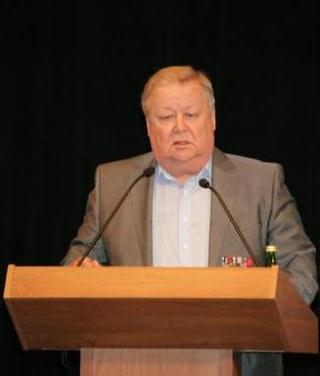 The report on the work of the section "ICT use in Education" was made by Vladimir Tikhomirov,
President of the Moscow State University of Economics, Statistics and Informatics. It was
noted during the section the educational institutions of Yugra have very high
level of informatization and have accumulated big experience, which requires
generalization and distribution. The report on the work of the section "ICT use in Education" was made by Vladimir Tikhomirov,
President of the Moscow State University of Economics, Statistics and Informatics. It was
noted during the section the educational institutions of Yugra have very high
level of informatization and have accumulated big experience, which requires
generalization and distribution.
At the same time it was noted that
the existing normative base is poorly oriented on ICT use in the educational
process. Necessary subordinate acts for the law “On Education” do not exist.
Despite the fact that the law making
process in the sphere of electronic education has activated, Russia falls behind
from developed countries. Therefore it was proposed to prepare analytical report
on the status of electronic education in Russia. A specific topic of discussion is the
development of on-line resources, situation with which requires thorough
examination.
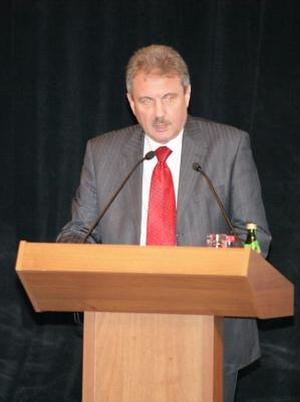 Section "ICTs in the sphere
of health protection" was chaired by Georgiy Radzievskiy, Head of Division
of Department of information technologies and communications of the Ministry of
Health of the Russian Federation. Following the results of the section a number
of problems were brought to light. Section "ICTs in the sphere
of health protection" was chaired by Georgiy Radzievskiy, Head of Division
of Department of information technologies and communications of the Ministry of
Health of the Russian Federation. Following the results of the section a number
of problems were brought to light.
At present international
standards are not being implemented in the sphere of health protection at a
required level, and it retards the development of information systems and
decreases their compatibility. Till present the fundamental problem has not been
sold, which is related to uprisal of information systems, which make doctors do
double work because control organizations refuse to accept reporting in
e-format. The issue related to wide range access of
medical institutions to Internet in a number of subjects of the Russian
Federation is not solved till now. Participants
of discussion proposed practical recommendations aiming to solve these
problems.
The results of work of the section
"E-Budget" were summarized by Elena Gromova, Head of Division of
Department of information technologies of the Ministry of Finances of the
Russian Federation. According to the opinion of participants of the section, main
attention now needs to be paid to standardization and unification of processes
in the sphere of economic activities and implementation of electronic work
flow.
This will provide for increase in transparency of processes and awareness of people on the state expenditures. Participants
spoke for organization of open discussion on development of state policy in
public finance management.
The results of work of the section «ICT use in the sphere of culture" were summarized by Tatiana Ershova, IIS Director General. The section was attended by employees of culture management authorities, as
well as representatives of museums, libraries and commercial companies
developing IT-applications in the sphere of culture.
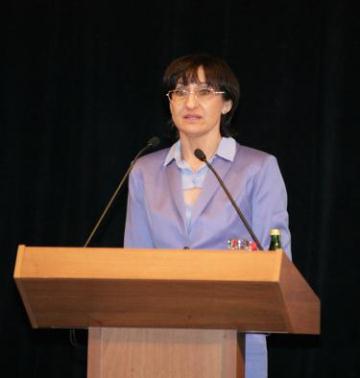 Analysis of processes of mastering
by cultural establishments of information technologies was made, and it was concluded
that it’s time maximum digitalize collections of museums, libraries and
archives, including use of cloud technologies. In this context particular
importance goes to development of ICT-competencies of employees of cultural
establishments, as well as users. Analysis of processes of mastering
by cultural establishments of information technologies was made, and it was concluded
that it’s time maximum digitalize collections of museums, libraries and
archives, including use of cloud technologies. In this context particular
importance goes to development of ICT-competencies of employees of cultural
establishments, as well as users.
Section "Implementation
of satellite navigation technologies with the use of GLONASS system and other
results of space activities" was presented by Andrey Kupriyanov, Executive
Director of Association “GLONASS/GNSS
Forum”. The state policy in the sphere of navigation technologies use was
discussed at the section.
Experience of Khanty-Mansiysk Autonomous Region - Yugra was highly appraised, specifically experience in use of results of space activities for monitoring of specially protected natural territories and for reorganization of transport infrastructure. Andrey Kupriyanov handed over commemorative medals for contribution to the development
of satellite system GLONASS.
The results of work of the section
"E-Democracy" were summarized by professor of the Faculty of Law of
MSU Elena Lukyanova, member of Public Chamber of RF. She highly appraised the processes taking course
in Yugra, and stated that this region, more than any other region of Russia,
went a great way ahead in understanding of problems and methods of e-democracy
system implementation.
Following the results of the work
of the section a number of practical recommendations aimed at improvement of legislative
base of e-democracy and distribution of new forms of public expertise and public
control were developed.
Section "Geoinformation
system in management" was presented by Sergey Miller, President of GIS
Association. At the heart of the discussion was openness of data, including cancellation
of copyrights for geographical maps production and providing direct access to
databases of public authorities (by sample of Russian State Register).
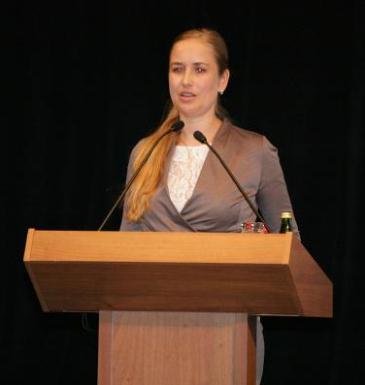 Section "ICT-infrastructure
for social and economic development" was chaired by Elena Boyko, Councilor
of the Ministry of Communication and Mass Media of the Russian Federation. She gave notice to very active work of
participants of the section, which provided for examination of the problem from
different points of view. Following the results
of discussion participants came to a conclusion that development of wide range
access on the basis of private-state partnership is necessary. Section "ICT-infrastructure
for social and economic development" was chaired by Elena Boyko, Councilor
of the Ministry of Communication and Mass Media of the Russian Federation. She gave notice to very active work of
participants of the section, which provided for examination of the problem from
different points of view. Following the results
of discussion participants came to a conclusion that development of wide range
access on the basis of private-state partnership is necessary.
Concept of creation of a
unified telecommunication infrastructure for public authorities was discussed,
and it was proposed to work through the legislative base for implementation of
cloud technologies. During the section
recommendations for computer literacy increase for ordinary people and public
servants were developed.
Viktor Zabolotskiy, Chairman of
the Public Chamber of Khanty-Mansiysk Autonomous Region – Yugra, member of the
Public Chamber of the Russian Federation, proposed to examine at the next Forum
how the decisions of 2013 are implemented.
Yury Hohlov, Chairman of the IIS
Board of Directors, and academician of the Russian Engineering Academy highly
praised the level of IT-Forum and expressed hope for a meeting next year.
All leaders of sections thanked
the Government of the Autonomous Region and the Department of information
technologies for excellent organization of the IT-Forum and high quality of
delivered reports.
Director of the Department of information
technologies Andrey Borodin in his turn thanked the participants for active
work.
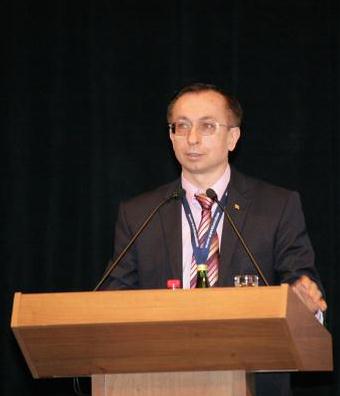 Alexander Kim, First Deputy Governor
of Khanty-Mansiysk Autonomous Region – Yugra, in his final speech noted that in
the last two years a huge work on e-government creation and transition to new forms
of interaction between the authorities and the population was executed in the country. He paid special attention to systems of support
of managerial decisions, such as Territorial information system Yugra, which
provide public authorities and citizens with reliable information.
The program and materials of
the Forum can be found on the official web-site. Decision of the IT-Forum have
been placed in official information resources of the region for public
discussion within 30 days. Alexander Kim, First Deputy Governor
of Khanty-Mansiysk Autonomous Region – Yugra, in his final speech noted that in
the last two years a huge work on e-government creation and transition to new forms
of interaction between the authorities and the population was executed in the country. He paid special attention to systems of support
of managerial decisions, such as Territorial information system Yugra, which
provide public authorities and citizens with reliable information.
The program and materials of
the Forum can be found on the official web-site. Decision of the IT-Forum have
been placed in official information resources of the region for public
discussion within 30 days.
|

